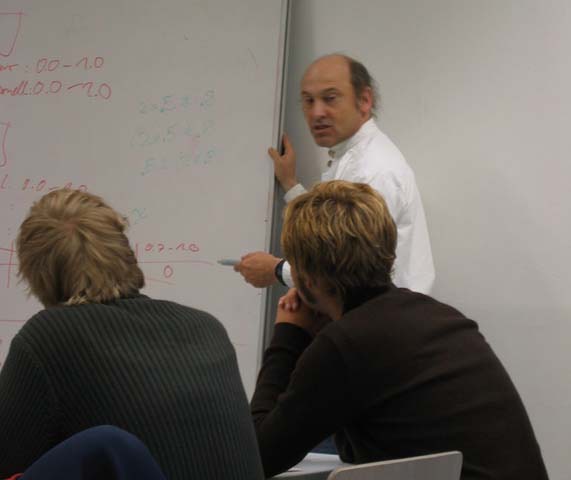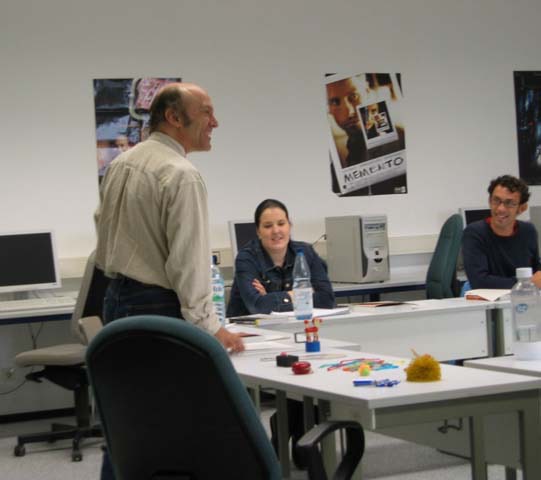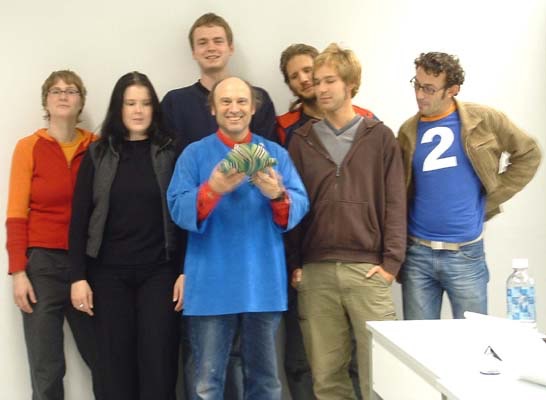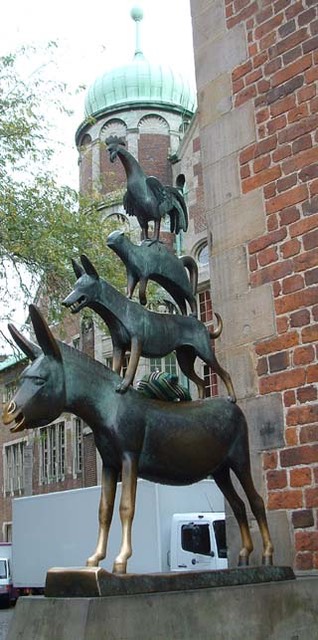October 4th, 2004
I spent two weeks, from September 22 though October 1, teaching at the University of Bremen. The class is entitled "Understanding Interactivity" and we had eight students from the Digital Media program in attendance. These German students are more fun to teach than the American students, for a variety of reasons. First, they’re older than the average American student, having spent a few years working in industry. This makes them more serious about their education; they don’t much care about their grades but they do care deeply about what they learn. Class discussions were always top-notch and many interesting points were raised.
For example, an interesting concept emerged during class discussion on Thursday. We were considering the complexity of relationships among the verbs of any given program. Games have many complex relationships among the verbs. For example, if you choose to increase funds for research in Civilization, that reduces your taxes or your luxury spending, which affect other factors that in turn affect other factors -- it’s all very complex. This complexity is what makes a game so interesting. On the other hand, you want the reverse in a productivity application. You don’t want to worry about how changing the font might affect, say, the tab settings. You want the verbs isolated from each other. Why the difference? I suspect that it’s because the game is a learning exercise in which you attempt to understand the system of the game -- the relationhips among the verbs. Whereas in the application program you want to immediately understanding the application model -- the relationships among the verbs -- so that you can USE it. That’s the basic difference: the the game you seek to LEARN the internal model while in the application you seek to USE it.
Here are some photos:

At work in class.
Having some fun in class
The class with Frogger-Rogger
Malte Diedrich
Malte took care of the logistics of the course. Malte did a fantastic job, taking care of every little problem. He was a major factor in the success of the course. He even got up at 4:15 AM on a Saturday morning to see me to the airport, even though it wasn’t really necessary. He just wanted to make absolutely certain that everything went perfectly.

The ice cream lady
Every day we went to lunch at the student cafeteria. After lunch, I stopped by the ice cream booth and bought an ice cream cone with a single scoop of chocolate ice cream. She got used to seeing me and pretty soon I didn’t even need to order; she’d just say "Ein shokolade!" and I’d laugh and nod. Last year I brought her an emu egg from Oregon; this year I brought her a giant pine cone from a sugar pine.
The tourist
My free weekend in Germany was spent on light activities; the teaching is so intense that I wanted more than anything else to get some rest. I spent Saturday morning walking through downtown Bremen, observing the people. There was some kind of ecumenical church day in the town square, which was filled with stands showing off all manner of uplifting groups. There were, of course, plenty of conventional church groups; I was particularly impressed watching a group of religious people dressed in traditional monks’ robes. There seemed to be more women than men in the group, and I noted how easily they spoke with people and how serene they seemed. There were also a variety of, shall we say, unconventional beliefs represented. There was some sort "worship the earth" group and another group of Maltese Knights. The atmosphere was happy all around; people mingled freely and the religious people seemed to be explaining rather than preaching. One group had a clever scheme for taking a quick public poll on some local civic issues:

This led me to think about the differences between American religion and this German religion. Of course, neither side can be reduced to simple generalizations; both groups are highly disparate collections of people and beliefs. With this caveat in mind, I’d like to offer some thoughts about the, shall we say, "hard-core" American Christians.
The funny thing is, these hard-core Christians are not truly Christians; they are followers of the Old Testament, not the New Testament. When asked for a simple digestion of his teachings, Christ responded, "Love they neighbor". Yet hard-core Christians subordinate that injunction to lesser teachings, most of them from the Old Testament. For example, they passionately oppose gay marriage on biblical grounds. If they truly loved their neighbors they wouldn’t be so eager to deny them societal privileges.
1. They believe that one American life is worth more than one foriegn life. The loss of 3,000 American lives on 9/11 unleashed an outpouring of fury; the loss of thousands of lives in Darfur barely attracts their attention. American casualties in Iraq are widely noted, but Iraqi civilian lives, about ten times greater, are of no concern to these people.
2. They believe that Islam is an evil religion, or, at the very least, much inferior to Christianity.
3. They believe that America is a Christian nation and that Christianity has a rightful place in American government policy. They reject the notion of the separation of church and state. They believe that Christian beliefs should be taught in public schools, that the Ten Commandments should be displayed in government buildings, and that other symbols of Christian faith should be included in government installations.
4. They reject the theory the evolution and embrace creationism, and believe that schools should teach creationism as science even though it is not accepted by scientists.
5. They believe that criticizing the government is unpatriotic and doing so in time of war is treason. They believe that revealing embarrassing truths about government activities during times of war is also treasonous.
6. They reject the notion of "a government of laws and not of men". They believe that Americans have a duty to obey the President regardless of their own opinions. They are so sure of the rightness of their beliefs that they are willing to bend and occasionally break the law in the pursuit of the power to implement their beliefs. They do not believe in compromise unless they have no alternative, and even then they consider compromise temporary. If they have 51% of the votes, they feel entitled to cram anything they desire down the throats of the 49%.
7. They believe that laws exist to protect good people and punish bad people. They think that people accused of terrorism do not deserve the same legal protections that "good" people deserve.
I took some pictures of Frogger-Rogger on various landmarks:


Frogger with the Bremen musicians Frogger on a statue
A Trip to the coast
Today Barbara Gruter took me, her daughter Maria, and a graduate student named Stephanie on a trip to the North Sea coast. We spent two hours at the beach. It’s not actually a beach in the normal sense of the word. Yes, there is sand, but the land is absolutely flat and slopes down very shallowly. Thus, there is an extended mudflat that the Germans call "Watte" that stretches for miles out into the sea. At low tide, it is all exposed and one can walk all the way to the island of Neuwerk, some five miles out. Of course, you have to high-tail it back before the tide turns or you’ll have to take the ferry back, and it won’t take you to your point of origin. Unfortunately, the timing of the tide was wrong for our visit. High tide was at 11:30 AM and low tide was at 6:30 PM; we arrived around 3:00 PM. Barbara’s dog Lika had the time of her life frolicking in the shallow water, chasing balls and sticks, and getting very wet. All the dogs on the beach seemed similarly entertained. The Germans, in their organized way, have organized the beaches for various activities and the "dog beach" was a good kilometer from the parking lot, but the walk to the dog beach was pleasant. Barbara deliberately flouted the rules on the return, crossing into the "no dogs" beaches all the way back; the beach attendant chastised her for breaking the rules.
I scoured the beach for rocks and was not disappointed. There were of course lots of flint pieces, of many colors. I found some particularly nice pure white and near-translucent pieces, as well as a good black piece. There was also some quartz, interesting for its fine veins. I also found some odd granitic pieces and a reddish rock with short parallel lines of black interspersed throughout. There were two mystery pieces: a piece that looked for all the world like pumice (a thousand miles at least from the nearest volcano); and a green piece looking rather like serpentine. This is all quite confusing; I shall have to present these to the geology professor back home. Oh yes, we also found some big black pieces with crystalline structures. Weird.
I asked Barbara and Stephanie if they felt that American foreign policy over the last three years made them feel that the EU should develop itself as a counterweight to America; they both acknowledged strong feelings in that direction. I asked if they felt other Germans felt the same way and they suspected that this was the case. What if Kerry is elected and tries to fix things, I asked. No, they have learned their lesson that the USA cannot be completely trusted and Europe can no longer follow in America’s footsteps. Thus the enormous moral sway America has held for so many decades has been squandered.
All in all, a fine day with good people.
Tuesday, September 28th
For a long time, I was disturbed by the German tendency to use the word "Asshole" at every opportunity. They pepper their conversation with it, and its use is not confined to the young. Even gray-haired matriarchs let loose with a torrent of "asshole"s in their conversations. I finally asked Malte why Germans were so fond of the word. It turned out that they were really saying "Ach so!" which means "Ah so", or, less literally, "I see".
I gave a seminar today on interactive storytelling to the faculty at the Hochschule Bremen. They had many more people than they expected and had to move us to a larger room. It was an intense lecture for me (I was sweating from the effort) but I feared that my overuse of colloquial English left some in the audience a little confused. Still, it seemed to be a success.
Friday, October 1
Over the past few days, I’ve been asking every German I meet whom they would like to see win the American election in November. They are unanimous in their preference for Kerry; they detest Bush. I have also asked them if they know anybody who likes Bush; they all say no, they don’t know anybody who likes Bush. It appears, then, that a huge majority of Germans would be unhappy with the USA if we were to re-elect President Bush.
Of course, Germans don’t vote in our election and one could argue that it’s none of their business. Actually, it IS their business, because the decisions of the American President will have a big impact on their lives. So they do have a valid interest in the election, even if they have no right to vote in it. But that’s not the point I want to make. I think the intensity of German feeling (and very likely, the feelings of billions of other people) is worthy of some consideration. If we ignore those feelings and re-elect Mr. Bush, we’ll be sending a strong message to the rest of the world that we don’t give a damn about them. That, of course, is our right. But later on, when we need some cooperation from them (and cooperation is vital to the global economy), we shouldn’t be surprised if they tell us to go to hell.
